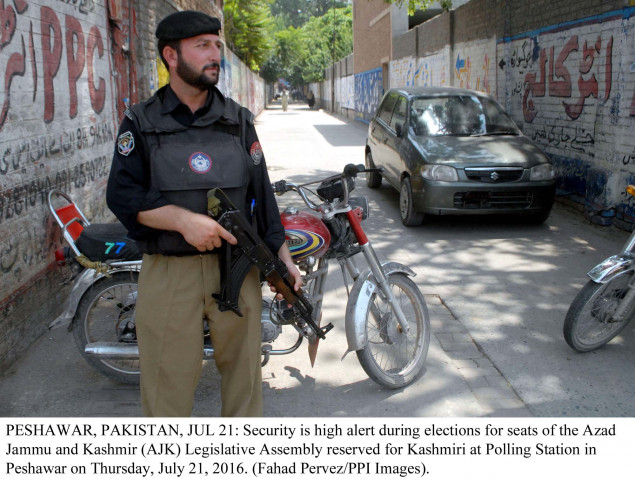K-P police, excise vie over narcotics control
Draft bill being debated in parliamentary panel on who gets control of special anti-drugs force

K-P Police. PHOTO: PPI
The Khyber-Pakhtunkhwa Control of Narcotic Substance Bill 2017, if passed by the K-P assembly, would repeal the federal government’s ‘Control of Narcotic Substance Act 1997,’ and the police will lose its powers in controlling the spread of narcotics in the province.
Under the 1997 law, the federal government had delegated powers of narcotic control to the police. Having enjoyed powers for nearly two decades, police are now unwilling to lose this power in the new bill. They argue that since a federal law on the subject exists, the provincial government need not make a new law.
The draft narcotics bill was first drafted by the excise department in 2013. After gaining approval from the provincial cabinet, it was presented in the K-P assembly. But the bill was referred to a parliamentary committee after senior police officials approached K-P assembly Speaker Asad Qaiser.
Officials of the K-P government close to the matter told The Express Tribune that the police is using back channels to drum up support amongst lawmakers to decide the matter in their favour.
Last month in a meeting of the committee, headed by K-P Minister Excise and Taxation Mian Jamshed, officials said that K-P government spokesperson Shah Farman and Pakistan Peoples Party lawmaker Fakhr Azam Wazir favoured the police’s argument.
However, Qaumi Watan Party’s lawmaker Anisa Zeb asked Farman why did he remain silent when the bill was taken up in the cabinet meeting. Farman initially tried to dodge the question by stating that he was not at the particular meeting when the bill was approved.
The government official, however, confirmed that Farman was present in the cabinet meeting which had approved the bill.
“They (the excise and taxation) department should have made efforts to include new narcotics in the federal law rather than opting for making a separate law,” K-P Police Additional Inspector General (Legal) Falak Nawaz told The Express Tribune.
He added that the provincial police force has the capacity to handle the issue since they were present in each locality of the province. On the other hand, he argued that the excise and taxation department would require a lot of resources to develop a proper force to curb the narcotic menace.
“The federal law gives powers to both, the police and the excise department for curbing narcotics, then why don’t they (the excise department) work under it,” he asked.
Nawaz went on to add that if the government had enough money to raise a force for the excise department, then it should be set up as a separate wing of the police — like the counter-terrorism department.
The K-P AIG further argued that officials of the police force already have the requisite skills and training to curb narcotics, having registered 108,558 cases, arresting 115,687 suspects over the past three years. Moreover, tonnes of hashish, opium, heroin and thousands of bottles of liquor were seized during this time. Officials from the K-P law department also backed the stance adopted by the police.
“The subject should stay with the police since they have a presence across the province and people are afraid of the police,” said an official of the law department, adding that while the excise department can recruit 1,000 personnel for its special narcotics control force, it would be insufficient to cover the entire province.
Excise and Taxation secretary Javed Marwat, meanwhile, argued that after the 18th amendment, narcotics control was devolved to the provinces.
“The federal government’s role is limited to opium, that too with regards to its cultivation and manufacture,” he said, adding that they have prepared a comprehensive law covering all the modern drugs and that this draft will be the first provincial law of its kind in the country.
“I am not snatching powers away from the police, rather I am strengthening their hands in curbing all the modern drugs used.”
Published in The Express Tribune, January 3rd, 2018.













COMMENTS
Comments are moderated and generally will be posted if they are on-topic and not abusive.
For more information, please see our Comments FAQ